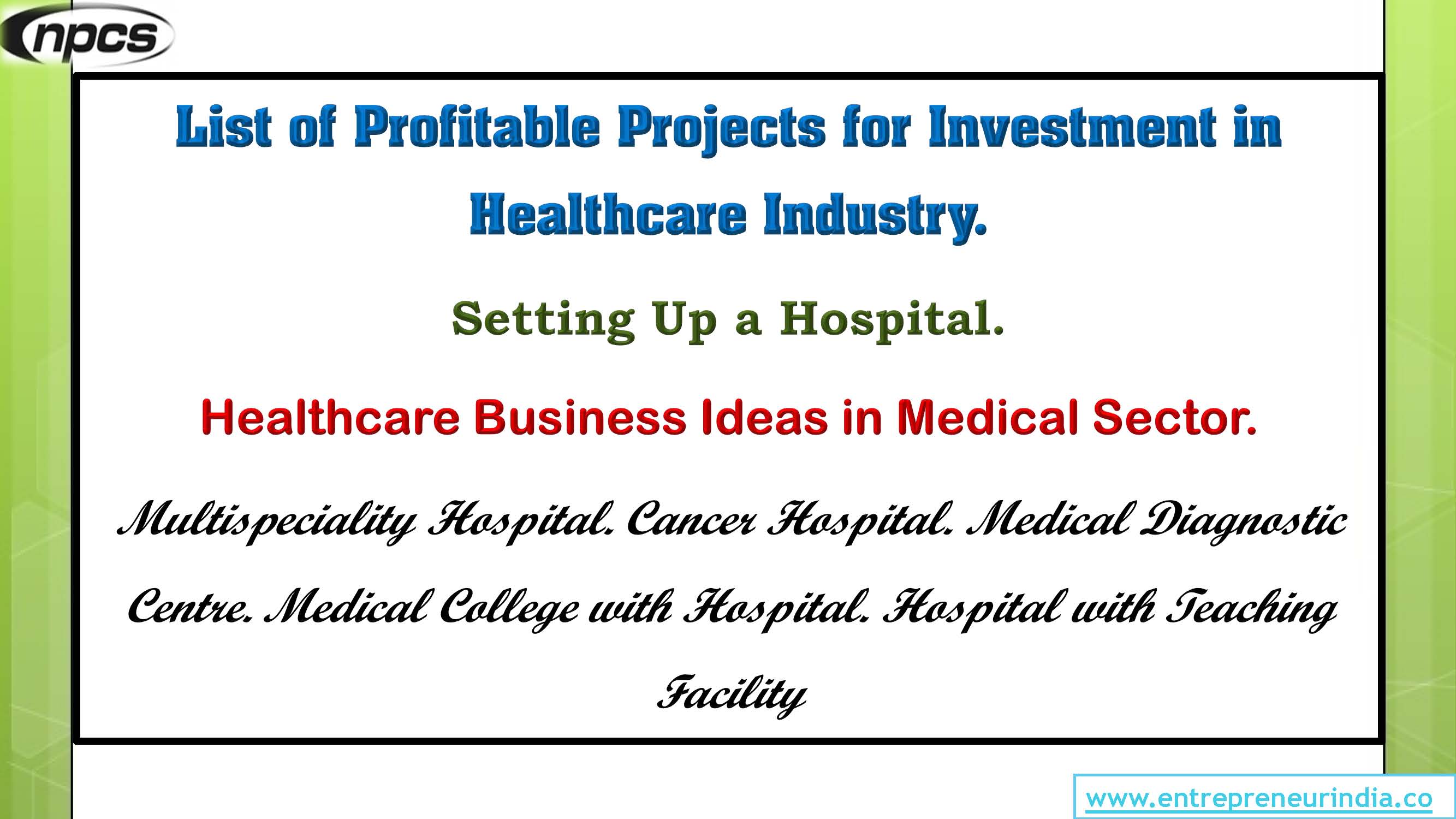
The global landscape is rapidly shifting toward health and wellness, making investment in healthcare industry one of the most resilient and high-yielding strategies in today’s economy. With an aging population, rising lifestyle diseases, medical technology breakthroughs, and increased health awareness, this sector guarantees long-term value. Entrepreneurs, institutional investors, and even startups now recognize healthcare as more than just a service—it’s a vital pillar of future economies. Investing here ensures not only robust financial returns but also contributes to societal well-being.
Contents
- 1 Why Investment in Healthcare Industry Is a Smart, Scalable Opportunity
- 1.1 Tap into Hospitals and Super-Specialty Clinics
- 1.2 Explore Diagnostic Labs and Pathology Centers
- 1.3 Capitalize on Digital Health Startups and Telemedicine
- 1.4 Back Pharmaceutical and Nutraceutical Ventures
- 1.5 Invest in Health Insurance and Fintech Health Platforms
- 1.6 Consider Rehabilitation Centers
- 1.7 Set Up Medical Equipment and Device Manufacturing
- 1.8 Support Preventive Healthcare and Wellness Startups
- 1.9 Enter the Medical Tourism Ecosystem
- 1.10 Conclusion
Why Investment in Healthcare Industry Is a Smart, Scalable Opportunity
Making an investment in healthcare industry presents unmatched growth potential. As demand rises across every demographic, investors can tap into diverse segments with varying entry points and ROI levels. From diagnostic labs to health tech, this sector combines necessity, innovation, and high revenue opportunities.
Tap into Hospitals and Super-Specialty Clinics
Private healthcare delivery is growing swiftly, especially in urban and tier-2 cities. Establishing hospitals or super-specialty clinics can generate high returns due to:
-
Increasing demand for quality care
-
Medical tourism in countries like India
-
Shortage of advanced care units in smaller cities
-
Ability to form PPP (Public-Private Partnerships) with governments
With NABH or JCI accreditation, hospitals can even attract global patients. Though capital-intensive, these ventures ensure stable long-term income through insurance reimbursements and empaneled services.
See Also :- Start Biofertilizer Production Unit
Explore Diagnostic Labs and Pathology Centers
Diagnostics form the foundation of treatment. Setting up:
-
Blood test labs
-
Radiology centers
-
COVID-19 or infectious disease test labs
-
Specialized testing units (genetics, hormones, etc.)
These units require moderate investment and offer quick scalability. Partnering with hospitals or telemedicine firms enhances reach. Moreover, home sample collection models have become the new norm, increasing accessibility and convenience.
Capitalize on Digital Health Startups and Telemedicine
Technology is transforming how patients access care. By investing in:
-
Teleconsultation platforms
-
Health record management systems
-
Online pharmacy apps
-
AI-powered symptom checkers
You gain a first-mover advantage in a field projected to exceed $500 billion globally by 2030. The pandemic accelerated digital health adoption, and the trend continues, making this a top pick for early-stage investors.
See Also :- Industrial and Hydraulic Hoses Manufacturing Industry
Back Pharmaceutical and Nutraceutical Ventures
Pharma remains one of the core pillars of the healthcare industry. Investors can:
-
Start manufacturing units for generics, APIs, or specialty drugs
-
Invest in nutraceuticals focusing on immunity, weight loss, or mental health
-
Support R&D-based ventures developing innovative therapies
Government policies like PLI (Production Linked Incentive) in India and FDA fast-track approvals in the US further boost this sector. Even small units can scale rapidly with proper branding and quality control.
Invest in Health Insurance and Fintech Health Platforms
Out-of-pocket medical expenses remain a concern. Health insurance penetration is still low in many developing countries. Investing in:
-
Insurance tech startups
-
Platforms offering digital health plans
-
Aggregators of medical loans and cashless facilities
Can create inclusive and profitable solutions. These ventures improve healthcare access while delivering fintech-level returns with low risk.
Consider Rehabilitation Centers
An aging population creates strong demand for:
-
Geriatric care facilities
-
Home care services
-
Physiotherapy and rehab centers
-
Dementia and Alzheimer’s specialty homes
This segment is still underserved but growing. Investors can adopt a franchise model, partner with senior housing developers, or tie up with medical equipment providers for seamless operations.
Set Up Medical Equipment and Device Manufacturing
Medical devices are essential across all care levels. The scope includes:
-
Diagnostic devices (glucose meters, BP monitors)
-
Surgical instruments
-
Mobility aids (wheelchairs, stretchers)
-
High-end equipment (MRI, CT scan, ventilators)
Domestic manufacturing receives subsidies in many regions. With a strong supply chain, these ventures can cater to hospitals, home care, and government procurement channels.
See Also :- Hotel Business in India
Support Preventive Healthcare and Wellness Startups
Modern consumers want to avoid illness, not just treat it. Investing in:
-
Fitness and wellness platforms
-
Mental health apps
-
Functional food brands
-
Preventive health check-up chains
Opens doors to loyal, high-spending customers. These business models often run on subscriptions and retain users longer with personalized plans.
Enter the Medical Tourism Ecosystem
Countries like India, Thailand, and Mexico attract global patients for:
-
Elective surgeries
-
Fertility treatments
-
Cosmetic and dental procedures
-
Cardiac and orthopedic care
Building medical tourism facilitation services—like travel + treatment packages—offers a lucrative way to connect global patients with top-rated hospitals and doctors.
Conclusion
The investment in healthcare industry is not just profitable—it’s resilient, transformative, and mission-driven. Whether you’re a startup founder, a private equity fund, or an individual investor, this sector welcomes innovation, impact, and scale. With the right due diligence, partners, and market understanding, you can tap into a high-growth industry that continues to thrive regardless of economic cycles.














